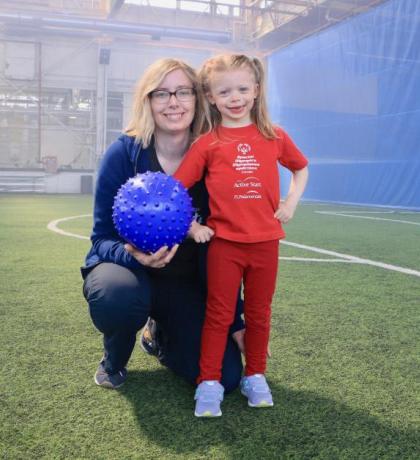
Every Thursday morning five-year-old Alma Loken jumps out of bed filled with excitement.
“I’m awake! It’s Special Olympics day!” she exclaims.
Since she was two-years-old, Alma has been attending Active Start, a Special Olympics program for children with intellectual disabilities aged two to six-years-old. The weekly community program helps her develop basic motor and sport skills through fun and positive movement experiences.
Alma has Williams Syndrome, a genetic condition present at birth that typically occurs with medical and developmental problems. At two-years-old she used a walker to get around, which made it difficult to find inclusive community programs and activities.
It was often suggested to put Alma with a younger group of kids who weren’t yet walking.
“Rather than see her strengths, people were just seeing the weakness or the walker or just that she was different,” her mother Melanie said. “There I am, sitting with my two-year-old and wondering, ‘Is this how it will be for her whole life? Is she ever going to be accepted? Is she only going to have barriers?’”
Then Melanie saw the 2015 Special Olympics World Summer Games in Los Angeles, California.
“I just knew that this was the one place that was going to help Alma reach her full potential,” she said.
Melanie looked into Special Olympics Canada programs and helped bring Active Start to her Regent Park community in Toronto.
“In only a short time at Special Olympics she went from being this kid with a walker to walking independently, to running,” she said. “She can kick a ball, she can throw a ball … she’s made friends.”
Melanie wanted to find a place for her daughter to be challenged, pushed to try new things and develop new skills – “and that’s what happens every week at Special Olympics.”
It’s even helped Melanie and her husband as parents of a child with an intellectual disability.
“When there are setbacks or challenges at school or at home you always know there’s going to be other parents there you can talk to,” she said. “It’s just a really holistic group for our family to share our experience.”
Before Special Olympics, Melanie felt like everywhere she turned “people were shutting doors on us.”
“At Special Olympics, people stand with us and help kick those doors down,” she said. “It makes me feel empowered, it makes me feel like there are so many opportunities for her and so many ways that she can contribute to the world.”
While Alma has yet to join a specific sport, she’s already expressed interest in figure skating, rhythmic gymnastics and baseball.
“It’s life-changing for kids like Alma,” said Melanie. “Knowing that there are people standing by to ensure she has accessibility and acceptance versus barriers and discrimination is just so meaningful.”
Alma is just one of many success stories at Special Olympics Canada.
Individuals with intellectual disabilities face challenges, both big and small, every day of their lives – challenges most will never encounter.
Special Olympics helps build confidence to take on these challenges in sport – and in life, empowering Canadians with intellectual disabilities to live their full potential.
No matter the feat, Alma – like all 45,000 Special Olympics athletes – has the same fearless response: Challenge Accepted.
